“Sorry, I won’t be able to meet up next week, as I will be working from Seoul”. Four times per year, I will have conversations along these lines with friends, colleagues, and clients. Four times per year, I have my own quarterly review (as I like to call it for lack of a better name), where I try to focus on working on, rather than working in. You might be reading this because you heard me saying this and/or it got you interested. So here’s my take on my personal quarterly review.
What is my remote quarterly review?
Four times per year I find a nice remote place, set up my laptop, bring a bunch of Post-its, and work from there. Rather than just working on my normal projects and daily tasks, I prioritize working on my own bigger goals and do some deep work on overarching projects and initiatives. For example, I might spend some time revising my workshop tools based on the recent workshops I did. Or I might work on my own trends database. Or I might be planning the big trips for next year. Or I might be doing my financial planning. In other words; tasks that need deep work and often are not prioritized during normal working weeks.
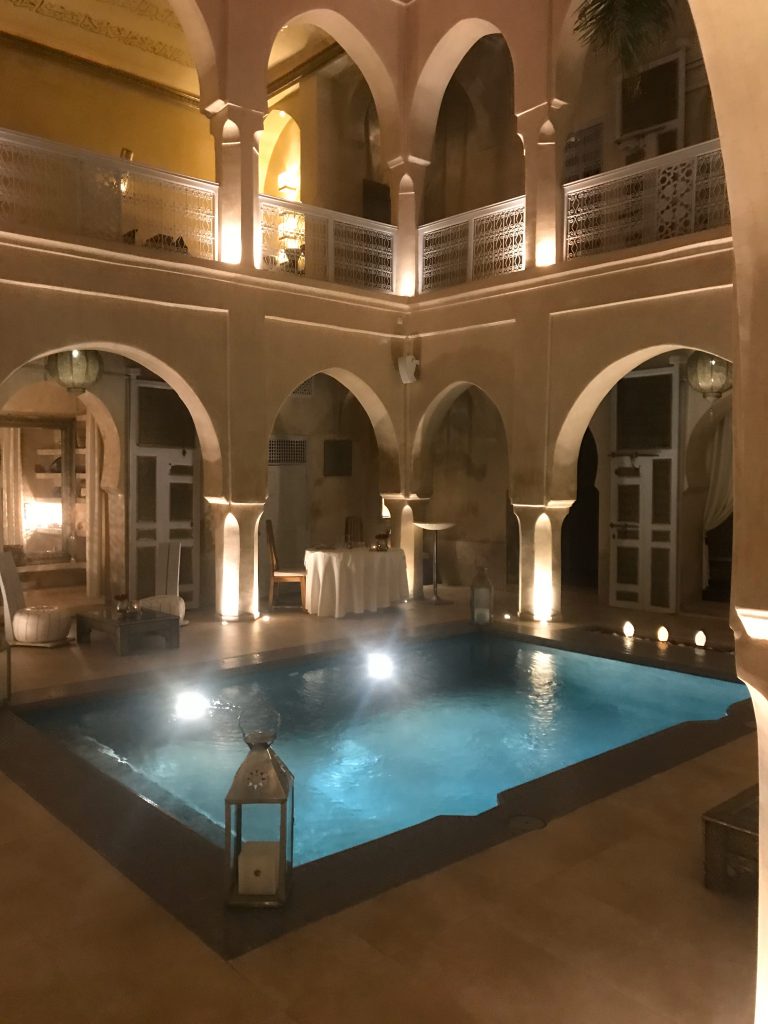
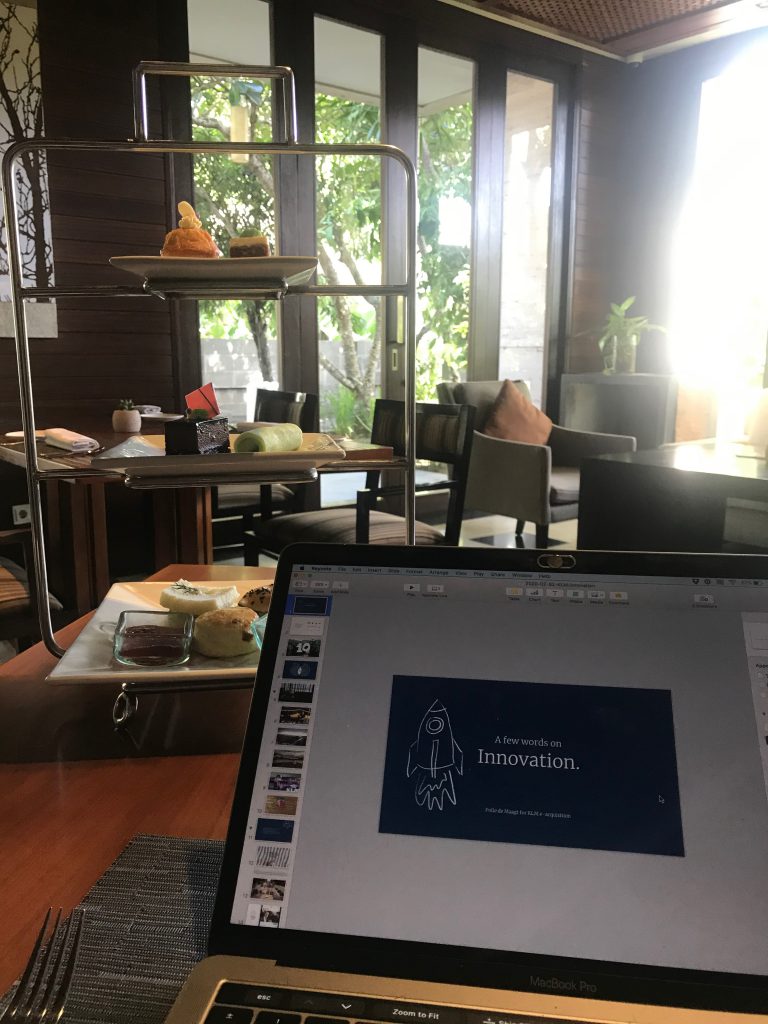
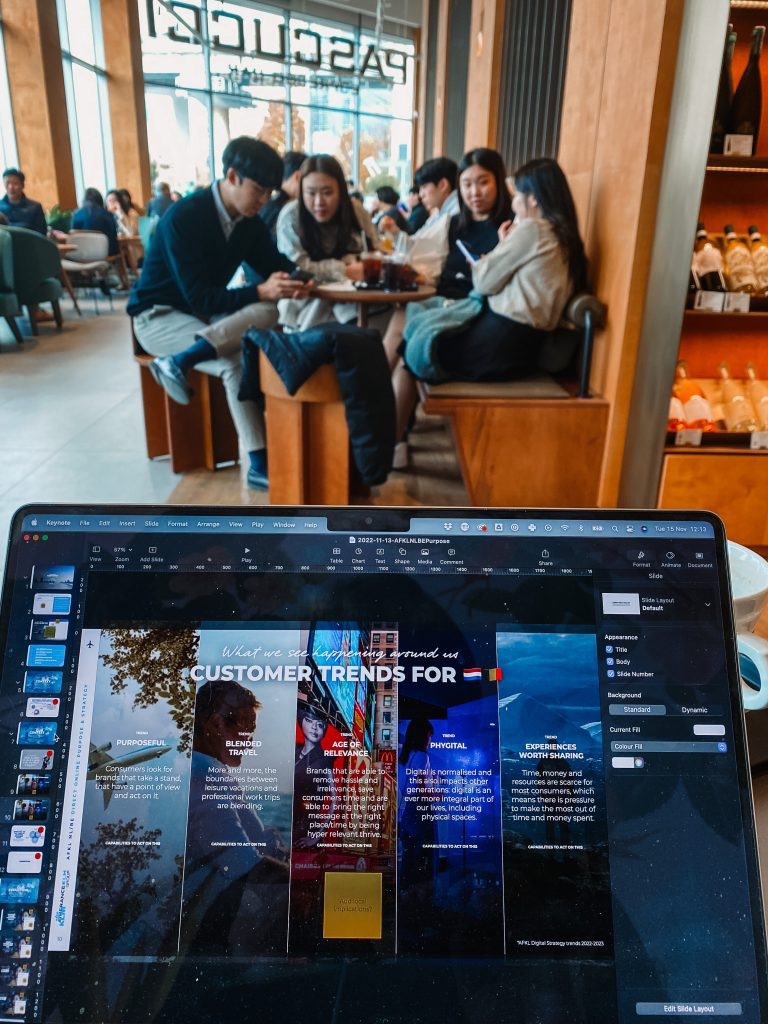
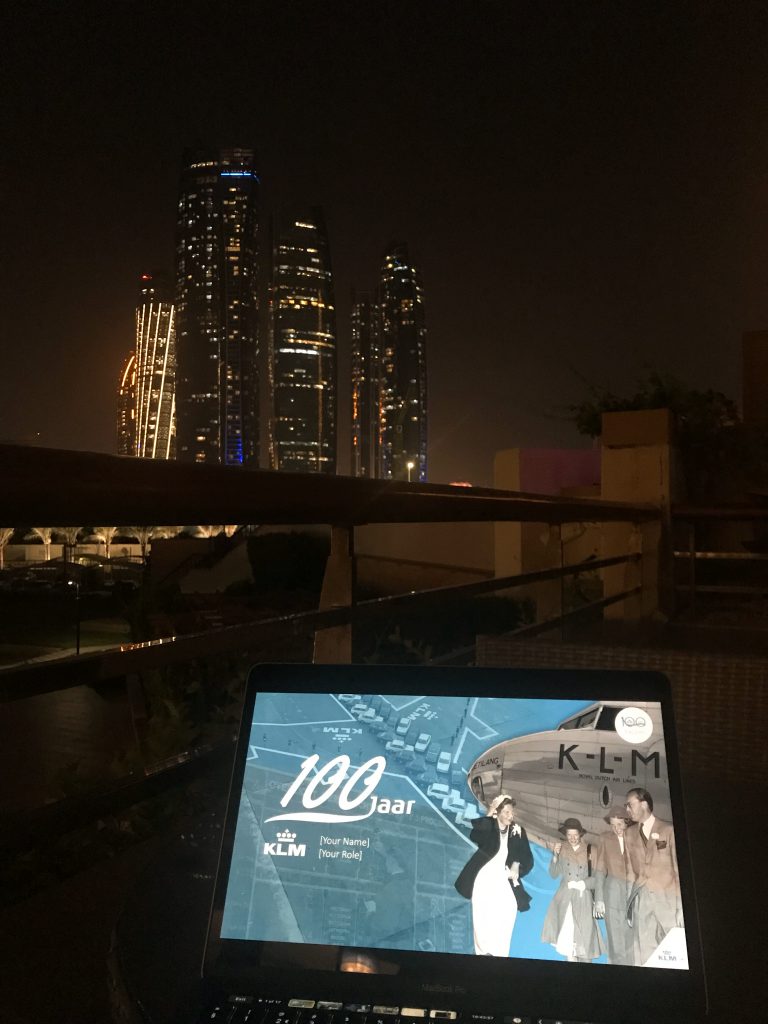
It has brought me all over the world, from a remote writer’s cabin in Estonia to the coast of Croatia, from the old gay district in Seoul to the souks of Marrakech, from a beach in Bali to a cabin overlooking a waterfall on the Faroe Islands and pretty much everything in between. The remoteness does not only create the distance I need to reflect, but also is like a small gift to myself, it allows me to explore new cultures, foods, and people.
Over the years (I started doing it in 2008 and turned it into a formal quarterly in 2018), I have refined my quarterly reviews and become even more intentional in how and when to use them. I try to keep this post updated on how I approach my reviews, how I apply them, what works for me, and what doesn’t work. Feel free to reach out or comment if you have comments, questions, tips, or additions.
Why a remote quarterly review
Someone once told me “distance creates insight” and I guess the same goes for the proverbs about the forest and the trees and the one about zooming in on an elephant so much you don’t recognize it’s an elephant. The point is, that it often pays off to remove yourself physically and mentally from your daily work and life.
The basic premise: working on versus working in.
Too often, we’re all overwhelmed by our day-to-day. There is some improvements to be made here, but these improvements are incremental. You try to do your job and live your life the best you can, but if you keep doing what you’re always done, you’ll keep what you’ve always got. That is the working in part.
Working on is about stepping back and reflecting on how you do the things you do. About being more intentional, effective, and efficient. About collaborating better with others. To being intentional about what you want/need and if the way you’re doing that right now is actually the best way to do that.
This working on mindset makes that there are two key purposes for my remote quarterly reviews: re-aligning on my key goals and objectives and having as much deep work time as possible on larger, over-arching challenges. I obviously combine this with exploring new destinations, cultures, but this is extra.
Re-aligning on key goals and objectives?!
Since my episode in the Intensive Care of a hospital, I have become more intentional and outspoken in my goals. I keep a list of things I like to do and achieve and break these down per year.
These goals can be literally anything. Big, small, private, work-related. For example, I want to visit 5 new countries every year. Last year, I decided I wanted to jump from a plane with a parachute. But it can also be about the amount I want in my savings account, about what fitness level I want to achieve, etcetera.
These goals and objectives help me in three distinct ways:
- I feel more accomplished. Just keeping a list of things you want to do and regularly tick them off, gives me a feeling of accomplishment. As an example, in autumn 2022, I suddenly had the feeling it had been a “bad” year. That I didn’t achieve much. Just looking back on all the things I’d done helped me realize that it had actually been a very fruitful year: some amazing trips, moving houses twice in two countries in two months, a good financial year for my company, plenty of amazing projects, trips to Faroe Islands and other amazing places … it instantly shifted my mood.
- I do more. Whether I achieve all my goals or objectives or not, just writing it down and at least trying will help me do more than if I had not done it. Aim for the stars land on the moon.
- I am able to do bigger things. Some projects or achievements just take time. E.g. I set out to have my eyes lasered. That requires several sequential steps to get done. Setting the goals and making sure to follow up on progress makes it easier to achieve. Same goes for buying house, exploring if I want to climb Mount Everest once, etc.
During my quarterly I set, update, review, refine my goals and objectives. Once a year (usually during my Q4 quarterly somewhere in December) I do my annual review where I set my new goals and objectives for the next year. It is not dissimilar to a Quarterly Business Review (QBR)/Annual Business Review (ABR) structure you will find more and more in bigger corporates, but then made personal.
Deep work?!
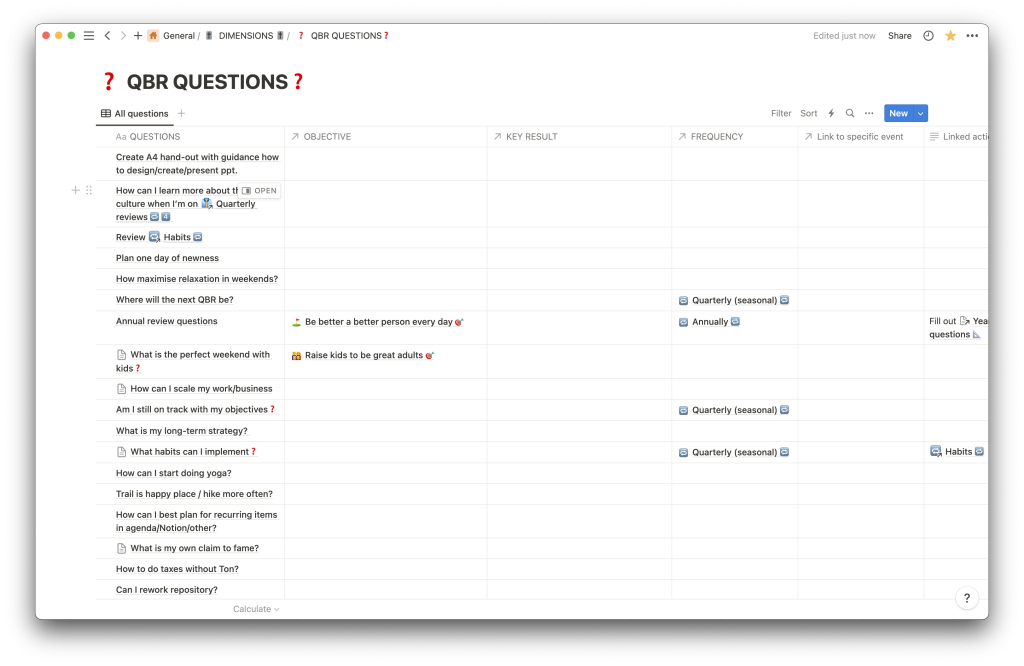
The main bulk of my quarterly is in truly doing the deep work; putting in the hours into the projects that need them. In Notion, I keep a backlog of all kinds of questions. Usually bigger questions that need an afternoon/morning or sometimes several days of deep work to figure out and usually don’t have priority during my normal work weeks.
It can be everything from thinking how I can have even better weekends with my kids, updating my trends database, reworking my Notion structure, reviewing my workshop exercises, reviewing my habits, …
I keep most of this in Notion and one of the most satisfying things for me there is that it starts out as a basic tool, but you slowly, steadily can expand functionality. E.g. I now have a list of all the hiking materials I have, a database with all my workshop exercises, etc. etc.
The extra’s.
I will go deeper into how I do that in a second. Because apart from these two objectives, there is a lot of additional value in these remote reviews:
- I love being able to go out for longer runs or longer hikes, to explore the area (Dubrovnik was perfect for running, Faroe Island was a dream for hiking). Having no company and or social obligations, makes it easy to plan for these;
- It is a great excuse to find or explore some decent food;
- I limit culture trips, but usually spend at least a part of one day exploring the city (as in Dubrovnik) or museum (as in Abu Dhabi);
- Working from the hotel lobby or a coffee place is actually a great way to get into contact with locals and learn things about the area. Demonstrating openness to culture and the sheer fact that you act differently from the other guests (it is quite rare that a guy comes to work in the hotel lobby most of the day while most of the guests are out at the pool);
- When I have the opportunity, I try to combine it with giving back to a local university. I get approached by local universities often. It has brought me to universities in Seoul and London to Hong Kong.
How the objective of my quarterlies is different
I briefly touched upon it before, but over the years, each of the quarterlies developed to have a distinct role:
- Q1/winter. This is usually a more practical quarterly review and helps making the plans I made in Q4 happen. Where my Q4 quarterly is often about reviewing objectives, setting new goals, this one is usually a personal wake up call that I need to start doing stuff and start putting things in motion to actually achieve this. That often means reaching out to people, setting up projects, making plans, etc.
- Q2/spring. This is probably my most business-like quarterly. I’m usually in the middle of bigger projects and opportunities for scale or subjects that need extra attention start to emerge.
- Refine workshop structures, models, frameworks, and exercises.
- Refine the trends overview I keep. A few years ago I started collecting trend reports from different industries (e.g. travel, retail, etc) and consultancy sources (McKinsey, BCG, Accenture, etc) as I got frustrated by the quality and repetitiveness of doing trend/business insight research for many of my clients. Rather than doing this over and over again, I started consolidating trends and insights in my own database. Twice per year I check sources for recency (>2 years old, I remove them from my key trends list), add new data points, revise my trends, etc. Remote quarterly is perfect for this.
- Q3/summer. This one probably comes closest to a ‘refinement’. As over half of the year has passed, it is a good moment to refine plans/goals. Either step up my game to make it happen (e.g. make sure I keep my statuses with travel loyalty programs, making sure I stay fit, etc) or postponing/revising my goals.
- Q4/autumn. As I often try to fit in a longer hike in October/November, my Q4 quarterly is usually somewhere in late November or in December. As it is the end of the year, it usually doubles as my Annual review, reflecting on the full year and therefor is usually slightly longer than the others.
- Final check on objectives and key results of the past year;
- Looking forward to the objectives and key results of the next year;
- Refine the trends overview I keep;
- Lock in all trips for the next year.
What I do on my quarterly reviews and how I structure them
I keep the following high-level structure:
- Even before my quarterly, I will keep a list of bigger todos and projects (in Notion). This will help me get an idea of what I want and need to do each quarterly. Often, I will allocate a ‘theme’ to the quarterly. E.g. ‘finance’ or ‘personal development’ or ‘grow my team’. This will help focus my activities and set clear goals. I will allocate recurring questions (e.g. updating the trends database) to specific quarterlies (Q2/4) or just put them in the list and decide per quarterly what has the highest priority.
- When traveling towards my remote quarterly review location and on the first night or first morning of my stay, I will do a full brain dump of all the things I will want and need to do that week. I sometimes use exercises like the ecocycle planning and hot air balloon for the first brain dumps.
- I will write down the activities on post-its and will prioritize the activities on a large mirror or wall.
- After that, I will create a simple week planning with my morning routine, what I will do in the morning (usually two activity blocks), lunch, what I will do in the afternoon, dinner and my evening routine. I will make sure to add time to eat good food and plenty of exercise. E.g. in Bali, I decided on evening runs and dinner after as part of my routine and yoga as part of my morning routine. Also, I will add new habits to my routines, e.g. write my daily appreciation journal in the evening. I have found these quarterly reviews a great moment to add new habits.
- After having the rough day plannings, I will add the concrete appointments I will have that week. From time to time, I will have some calls I will have to take, I might have a meeting on location and I might want to go explore the surroundings (e.g. in Dubrovnik, I planned a morning in the old town as a well-deserved break). I will try and make sure to have as many uninterrupted blocks of deep work time as possible.
- Finally, I will plan in all my activities for the week, making sure to prioritise the key activities first.
- And then, it is just do 🙂 Every evening, I tend to quickly review what I have done that day and the next morning at breakfast I will run through that day.
Where I do my quarterly reviews


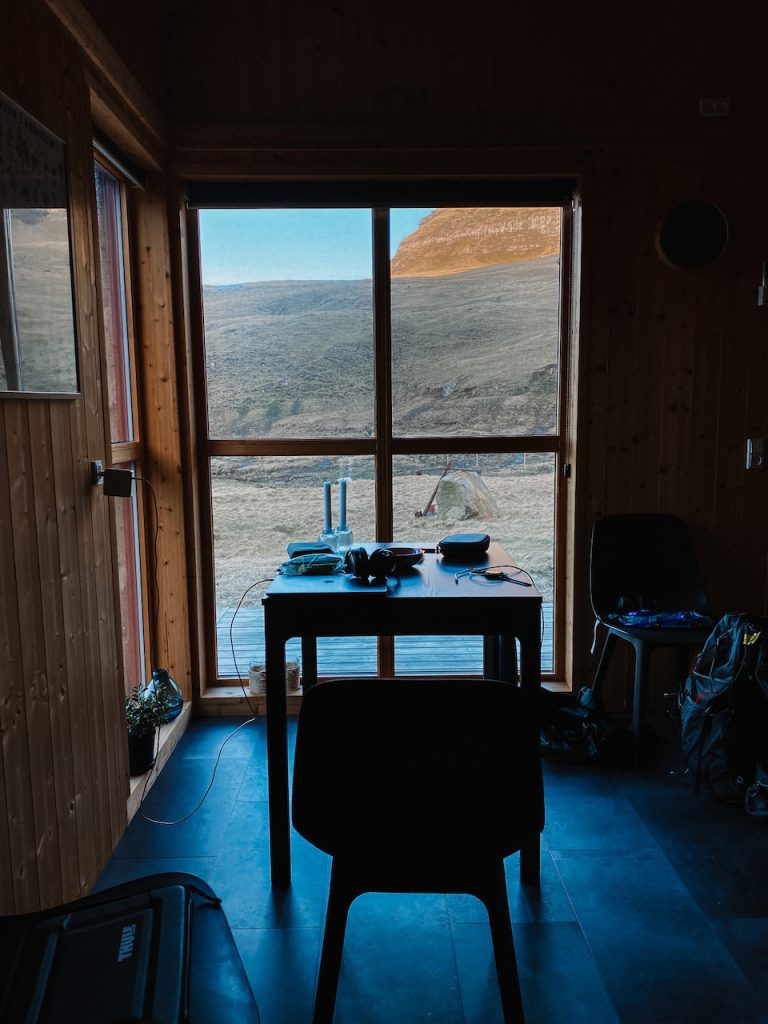
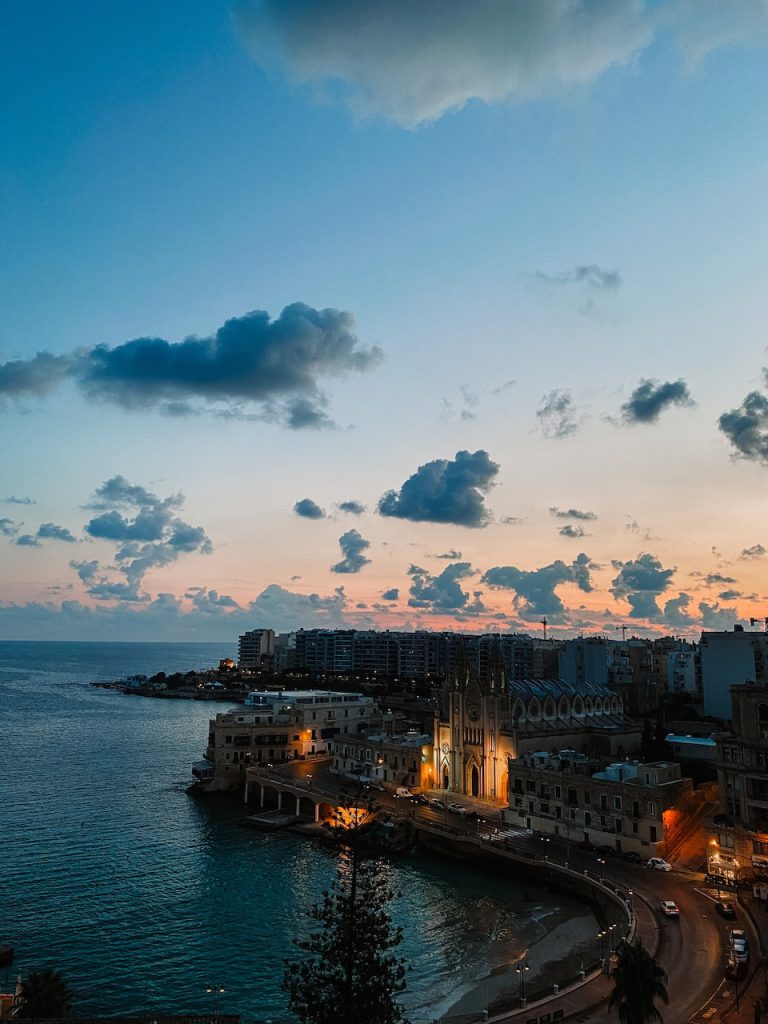
Over the years, I also have become more intentional about what I need from the environment of my quarterly reviews and where I want to do them. In an earlier post on my travel blog I wrote about the experiment and the variables I used for booking my stays:
- Not overly expensive (along the lines of my weekly spend on hotel when I’m traveling Europe)
- A country/city I had not been before (ideally a country/city on my bucketlist)
- Not too much travel time – as I would be only going for 5 nights, I didn’t feel like spending half a day or even a day of traveling. The only option would be having two night-flights. I went to Bali early 2020 and noticed the travel time is just too much.
Some additional things I found:
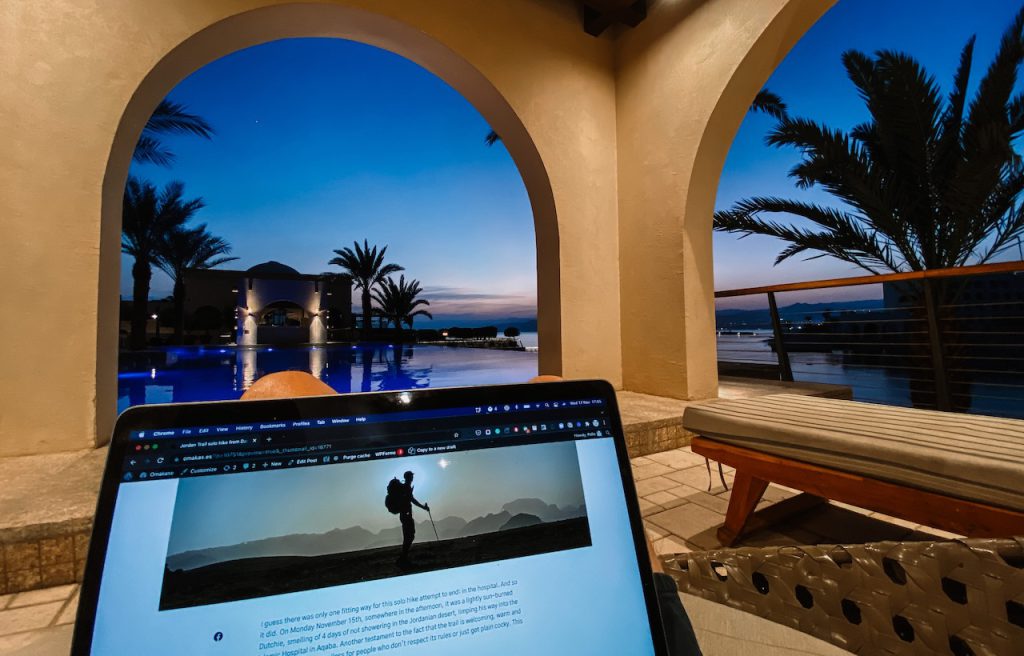
- Running nearby: Dubai was too hot to go out for a run, but running near the Dubrovnik hotel was just perfect. It made me realize I’m also looking for great running places and green areas around my temporary base.
- Using your bucket list: I’m keeping a wishlist of places both on this blog and in my todo system Notion. When looking for a new place to go for my Quarterly, this is usually a good starting point.
- Booking outside high season and/or shoulder seasons: As I’m rather flexible I’ve been trying to book in low or shoulder season in the destinations I’m going.
- Making a year planning: I started making a year planning of my trips as some trips work best in certain times of the year – e.g. end of summer (late July, early August) most of my clients are on holiday, which makes it a perfect moment to travel. Also, February seems to make sense as this breaks the sometimes harsh European winters. I had to learn the hard way that a Quarterly review in September in Abu Dhabi is just not the best idea. I liked Dubai during Ramadan better.
- Once a year, I indulge in a location with access to a resort-style swimming pool or beach (hey, important to unwind during the week), usually in Q4 when the weather in The Netherlands/Belgium is bad and I could use some Vitamin Sun.
- Smart use of hotel loyalty points: Both Hilton and Marriott give the 5th night free if you are redeeming points for your stays. That makes it extra interesting to use your points from these loyalty programs. I used it for Dubrovnik, Marrakech, and Bali.
Concluding quarterly reviews
Stepping back from my daily work once every three months has been a game-changer for me. I have been able to be more intentional with what I do, and therefor do more. I force myself to carve out time to work on myself, to avoid being overwhelmed by working in the projects I work on. I hope these elements inspire you; feel free to reach out or leave a comment with ideas, thoughts or feedback.